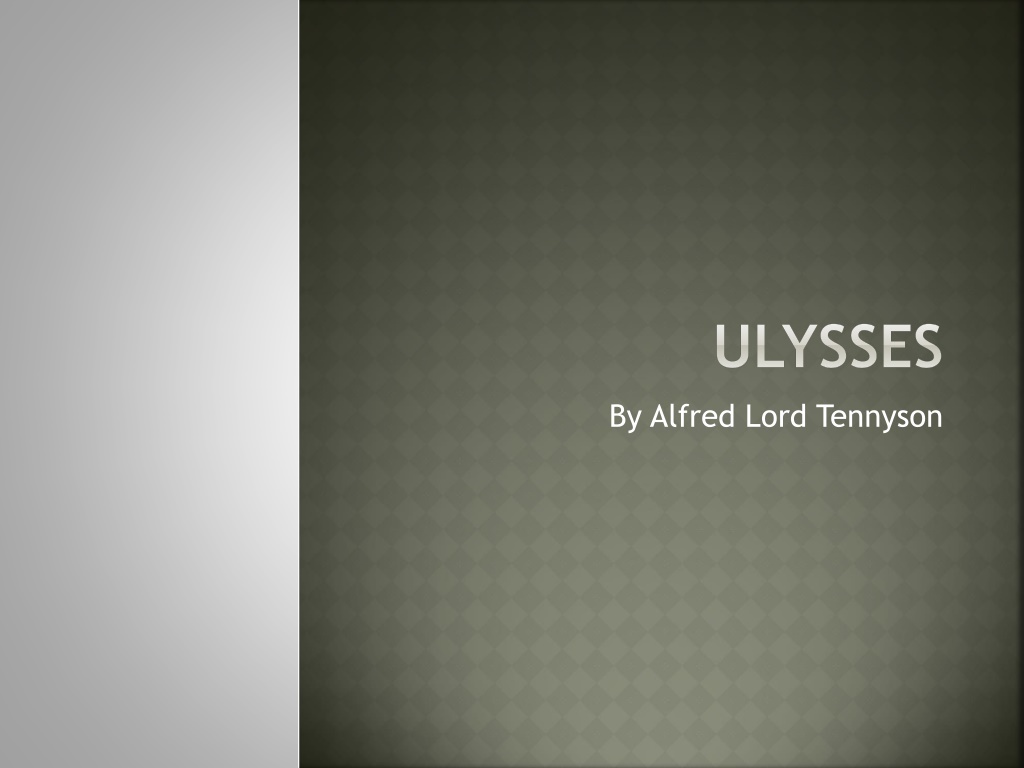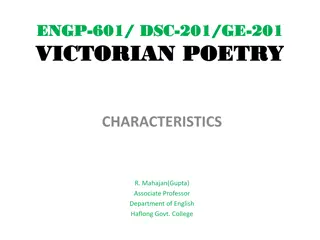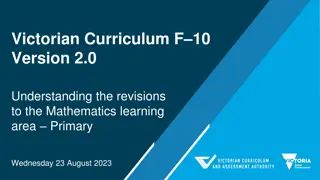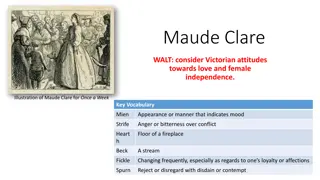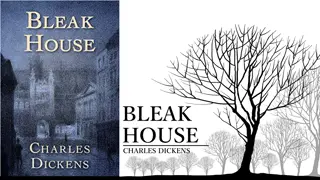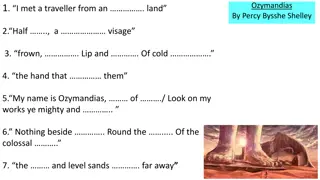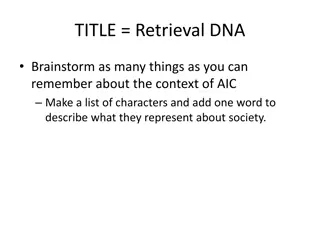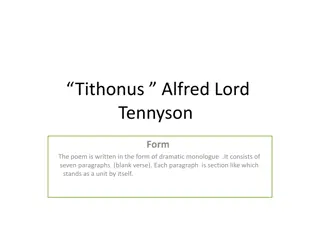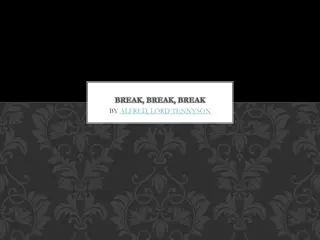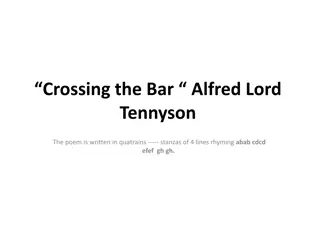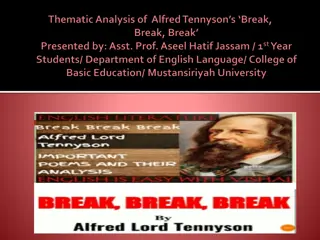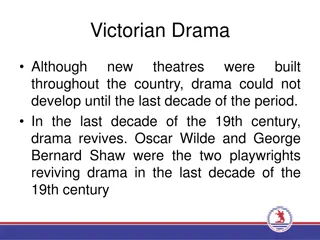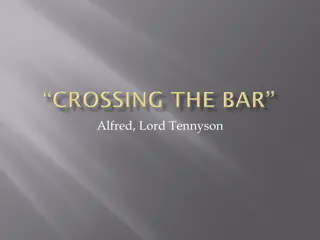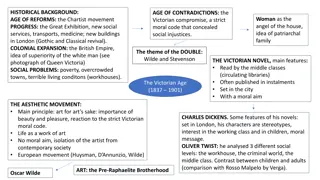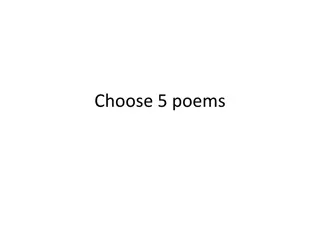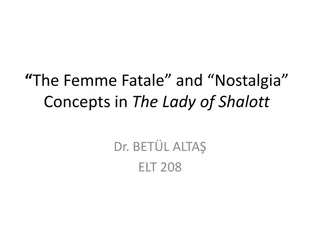Explore Ulysses by Alfred Lord Tennyson in the Context of the Victorian Era and Colonial Power
Ulysses, a mythical Greek king, desires to embark on new adventures despite being home. This desire for exploration is analyzed in the context of the Victorian Era, which valued honor and duty but also had social challenges. The poem is divided into three stanzas reflecting Ulysses' discontent with a stagnant life. It highlights the contrast between the desire for adventure and the responsibilities of home.
Download Presentation

Please find below an Image/Link to download the presentation.
The content on the website is provided AS IS for your information and personal use only. It may not be sold, licensed, or shared on other websites without obtaining consent from the author. Download presentation by click this link. If you encounter any issues during the download, it is possible that the publisher has removed the file from their server.
E N D
Presentation Transcript
ULYSSES By Alfred Lord Tennyson
THE VICTORIAN ERA Placed high value on honor, duty, and moral seriousness. Still have brutal factory conditions, low wages, and crowded cities, but the 1830s mark the beginning of political and social reform acts. Shift from agrarian society to industrial society creates a middle class (neither rich nor poor). 1800=75% rural versus 1900=75% urban
POWER AND EMPIRE Richest nation (first industrialized nation) Most powerful nation unchallenged military supremacy empire covers of earth s surface; the empire on which the sun never sets 18 major territories added including India, Canada, Australia, New Zealand, most of East Africa and the Caribbean Colonial domination rationalized purporting to demonstrate inferiority of dark-skinned people by a felt sense of racial and cultural superiority of the white race. The relation of a civilized to an uncivilized race, over which it rules, is exactly that of a parent to child, or generally adults to infants. --Alfred Russel Wallace, evolutionary theorist by pseudoscience
ULYSSES Ulysses (called Odysseus in Greek) is a mythical Greek king whose story is told in the Iliad (c. 800 b.c.e.) and the Odyssey (c. 800 b.c.e.) by the epic poet Homer. He was absent 20 years from Ithaca. based in part on book 11 of the Odyssey, which recounts the adventures of Ulysses on voyage home from the Trojan War. During a visit to Hades, the abode of the dead, Ulysses is told by the ghost of the seer Tiresias that after he returns home he will set off on a new journey that will end in a gentle death, possibly far from shore. Ulysses derives in larger part from book 26 of the Inferno (c. 1320) of Dante, who placed Ulysses in hell with the evil counselors those whose sin was abuse of the powers given them by God. Ulysses is
CENTRAL IDEA Ulysses desires to continue a challenging and adventurous life instead of staying stable at home.
Stanza form: the poem is divided into three stanzas, or groups of lines, coinciding with the division of thought. First stanza: Ulysses is speaking to himself expressing his dissatisfaction about the idle life and his longing for his former life of adventure. Second stanza: Ulysses speaks to an unknown listener about his son. Third stanza: Ulysses speaks with his old crew about the need to go again to the sea.
THE POEM It is useless It little profits that an idle king, The area around the fireplace suggesting his idleness treats and deals with savage people who do not even recognize his achievements By this still hearth, among these barren crags, Match'd with an aged wife, I mete and dole Unequal laws unto a savage race, That hoard, and sleep, and feed, and know not me. Live life to the fullest I cannot rest from travel: I will drink Life to the lees: All times I have enjoy'd Greatly, have suffer'd greatly, both with those Repeated for emphasis suggesting that Ulysses is a man of extremes That loved me, and alone, on shore, and when
Through heavy rains . A group of stars associated with rain Thro' scudding drifts the rainy Hyades Vext the dim sea: I am become a name; For always roaming with a hungry heart I have become famous because of my travels Much have I seen and known; cities of men And manners, climates, councils, governments, Myself not least, but honour'd of them all; And drunk delight of battle with my peers, Far on the ringing plains of windy Troy. I am a part of all that I have met;
Yet all experience is an arch wherethro' Gleams that untravell'd world whose margin fades For ever and forever when I move. How dull it is to pause, to make an end, unpolished To rust unburnish'd, not to shine in use! As tho' to breathe were life! Life piled on life Were all too little, and of one to me Little remains: but every hour is saved unpleasant From that eternal silence, something more, A bringer of new things; and vile it were Three years For some three suns to store and hoard myself, And this gray spirit yearning in desire Old man To follow knowledge like a sinking star, Links the idea of travel to knowledge and existence. He wishes to have a journey that no one has yet taken. Beyond the utmost bound of human thought.
Stick carried by kings and queens This is my son, mine own Telemachus, To whom I leave the sceptre and the isle, Well-loved of me, discerning to fulfill This labour, by slow prudence to make mild Telemachus mission is to civilize the rugged people of Ithaca A rugged people, and thro' soft degrees Subdue them to the useful and the good. Most blameless is he, centered in the sphere Of common duties, decent not to fail In offices of tenderness, and pay Meet adoration to my household gods, When I am gone. He works his work, I mine.
There lies the port; the vessel puffs her sail: There gloom the dark, broad seas. My mariners, Souls that have toil'd, and wrought, and thought with me cheerful That ever with a frolic welcome took The good times and the bad ones The thunder and the sunshine, and opposed Free hearts, free foreheads you and I are old; Old age hath yet his honour and his toil; before Death closes all: but something ere the end, Some work of noble note, may yet be done, He sees himself and his men as heroes who have to accomplish a noble mission Not unbecoming men that strove with Gods. The lights begin to twinkle from the rocks:
The long day wanes: the slow moon climbs: the deep Moans round with many voices. Come, my friends, 'T is not too late to seek a newer world. Push off, and sitting well in order smite The track or mark made in water by the oars The sounding furrows; for my purpose holds To sail beyond the sunset, and the baths The ocean where the Greeks believed the stars descended. He has no desire to return from his voyage Of all the western stars, until I die. It may be that the gulfs will wash us down: It may be we shall touch the Happy Isles, And see the great Achilles, whom we knew. Heaven of Greeks Tho' much is taken, much abides; and tho' We are not now that strength which in old days Moved earth and heaven, that which we are, we are; Most of his life is over and he achieved a lot, yet much remains. One equal temper of heroic hearts, Made weak by time and fate, but strong in will To strive, to seek, to find, and not to yield.
FORM Blank verse: the poem is written in Blank verse or unrhymed iambic pentameter. Dramatic monologue: is a poetic form in which the speaker of the poem is a character who addresses a silent listener. The Victorian period is the high of this form. It is commonly used Browning, Mathew Arnold, and others. Ulysses is spoken by Ulysses addressing an unidentified listener or his fellow mariners, expressing his discontent with living without adventures. by Tennyson, Robert
THE POEM AS AN ELEGY The tone of the poem is elegiac. It is one of many poems that Tennyson wrote in response to the death of his close friend Arthur Hallam. The poem in part is to express his grief and to cope with the death of his friend, Arthur Henry Hallam, to whose memory Tennyson would dedicate his long series of poems, In Memoriam (1850). Tennyson held that Ulysses expressed his feelings about Hallam s death, as well as asserting the need for going forward, and braving the struggle of life. The poem s reference to death as the end of a life full of adventures has a biographical relevance. The poem also laments the end of a life style; the life of a restless warrior and adventurer.
THEMES Fulfillment of life: Ulysses, reflecting the Victorian spirit, is not satisfied with the idle life he has after returning from the Trojan War. For him, life is not about accumulation of years, but is accumulation of experience and knowledge that comes adventure. While life without action and adventure lead to decay and regression, an active life makes one shine and excel. The poem is about the need to battle life out to the end. Tennyson can be seen as reflecting the spirit of the nineteenth century in approving the determination of Ulysses to explore the unknown no matter what the consequences; interestingly, abandons his wife and child is not treated as the violation of Victorian mores that it was. from hard work and the fact that Ulysses
Exploration, expansion, and colonialism: the poem is a propaganda imperialism. Ulysses is a representative of the of the spirit of imperialism during the Victorian period. His son, on the other hand, represents the other side of the empire while taming and subduing the colonized persuading the mariners to go for more battles, Ulysses mirrors the British colonial spirit that advocates the empire s expansion and fulfilling the empire s duty of ruling and civilizing the rest of the world. for the British savages. While
